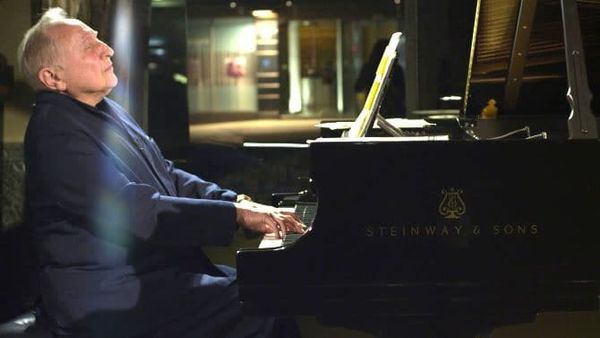 |
| Seymour Bernstein in Ethan Hawke's Seymour: An Introduction: "Seymour thinks that I'm trying to pawn him off as this youthful 85 year-old." |
New York Film Festival Director of Programming and Selection Committee Chair Kent Jones held a post screening discussion during the press conference for Seymour: An Introduction, with the director Ethan Hawke and his subject Seymour Bernstein. Hawke is currently starring in Richard Linklater's Boyhood with Patricia Arquette, Ellar Coltrane and Lorelei Linklater and he directed The New Group revival of Sam Shepard's A Lie Of The Mind with Alessandro Nivola in 2010. Nivola will star with Bradley Cooper and Patricia Clarkson in The Elephant Man this fall on Broadway.
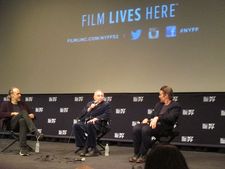 |
| Kent Jones in conversation with Seymour Bernstein and director Ethan Hawke at the New York Film Festival press conference for Seymour: An Introduction Photo: Anne-Katrin Titze |
Hawke expressed Tom Stoppard's trilogy The Coast Of Utopia nerves, what he sees in Jack Nicholson, Eugene O'Neill, and some Shepard wisdom. Seymour Bernstein called himself and Hawke re-creators: "When you play Macbeth, that's all already written. My task is to re-create a Beethoven sonata."
Seymour: An Introduction gives a glimpse into the life and philosophy of pianist and teacher Seymour Bernstein. Hawke starts out by showing his subject rummaging through his apartment with his dishes and pots and a breakfast that looks like cucumber salad with milk. Then come the piano students and in a fascinating succession, we learn more about the man and his superb understanding of music than any object could reveal. Private lessons, an NYU master class workshop and a conversation over tea with Seymour student Michael Kimmelman, author, New York Times critic, and pianist, round out the portrait.
Seymour talks about his childhood with "no music in the house" and how he begged his mother for piano lessons. Soon he discovered that when his practicing went well, "everything was fine otherwise." A wealthy spiritualist became an early patron and gave him free rein of her mansion in Scarsdale in Westchester County, New York. Seymour was sent on a concert tour to the front lines during the Korean War and the documentary makes him revisit his diaries of the time and confront what had been pushed aside.
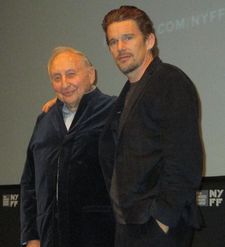 |
| Seymour Bernstein with Ethan Hawke: "You, Ethan, did that with me with this documentary. You took on my character." Photo: Anne-Katrin Titze |
Hawke's camera is allowed to be there through the tears and also when the octogenarian reorganizes his sofa-bed while talking about the "predictability of music" and the "unpredictability of the social world." Seymour speculates with a grin how his letter to the Queen of England might have had an impact on his teacher Clifford Curzon's knighthood and the relationship of age and truth: "At my age you stop lying to people - you say the truth and not just what they expect you to say."
Here are some of Ethan's and Seymour's witty tips for art and life as told to Kent Jones and the press corps.
Seymour Bernstein: Ethan said to me, the theme of the documentary ought to be how devotion and the discipline of an art form can not only improve the art form but radiate out into your life. That's the subject of the film. It suggests that practicing properly can make you not only into a better musician, but more importantly, into a better person.
Ethan Hawke: Insecurity and feelings of inadequacy can seem like some kind of horrible blemish that needs to be hidden. That can start tripping you up. I did the documentary to spend more time with Seymour to look at the subject more thoroughly with him. Not only was it not something to be ashamed of, but it's quite possibly something to be proud of. You are opening yourself up, you are putting yourself out there.
SB: On the day of your performance, when your head and your stomach change places with each other, you look at yourself in the mirror and you say, I have a right to be nervous. Of course, you have to be prepared. If you're not prepared you suffer a stage fright from which there's no return. If you're prepared, you have a right to be nervous because you are responsible. Responsible to your art, your audience, your own integrity.
EH: It reminded me of something Tom Stoppard had said. Tom said, "how are you doing?" and I said, "I am incredibly nervous" [doing his play]. He said "you better be." … What's so interesting to me about the world of piano is reminiscent about a Zen practice. What I find so hard about middle age is where are the mentors? When you're a kid, mentors are seeking you out. Then you are expected to be your own mentor.
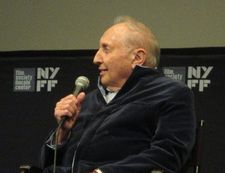 |
| Seymour Bernstein: "Ethan prepared me. He said, 'Seymour, you'll hate it the first time you see yourself.' And I heard myself play and I thought that's beautiful!" Photo: Anne-Katrin Titze |
SB: It has to be a master you really trust. Not all masters tell you their honest opinion, you know. It's very difficult to find someone who will tell you the truth. Your own inner voice tells you all you need to know.
EH: Watching you teach students you often would make the determination of how much truth they can handle.
SB: One pupil, who is also a teacher, asked me one day, "Seymour, how do you know what to tell a pupil?" No one ever asked me that before but I immediately knew what to answer him. Actually that's a very simple thing - you become the pupil. You take on the pupil's emotional, intellectual, and physical condition into yourself. And you ask, given these propensities, what would I do? You, Ethan, did that with me with this documentary. You took on my character.
EH: It's pretty easy, you just turn the camera on.
SB: Ethan prepared me. He said, "Seymour, you'll hate it the first time you see yourself." And I heard myself play and I thought that's beautiful!...I'm not 85, I'm 87.
EH: Seymour thinks that I'm trying to pawn him off as this youthful 85 year-old. He is actually 87. When we started he was 85… We've done a couple of film festivals. I've been doing film festivals and press conferences since I was 18. This was the first time I came out of Toronto feeling like I'd been on a spiritual retreat … The documentary is an extension of what he's been doing and thinking his whole life.
SB: I was thinking, why it is that you and I are drawn to each other? Well, actors and performing musicians are not creative people. They are re-creative people. When you play Macbeth, that's all already written. My task is to re-create a Beethoven sonata. You can create your own. And both you and I are re-creative and creative people.
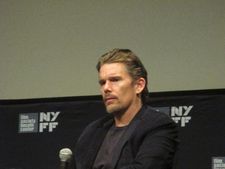 |
| Seymour: An Introduction director Ethan Hawke: "When you look at Jack Nicholson - there's a writer in him." Photo: Anne-Katrin Titze |
EH: So many actors have a writer that is dying to come out and they don't give themselves permission. When you look at Jack Nicholson - there's a writer in him.
Kent Jones: He wrote quite a few scripts and directed his own films. He also rewrote a lot of his own dialogue.
SB: I tell Ethan, I think you have to write the first great American play.
EH: The first one? Tell that to Eugene O'Neill!
SB: I believe our talent defines who we are. That doesn't have to mean a career. The positive and negative elements define who we are. The reason I think that is because our social world is very unpredictable. Someone closest to you could suddenly do something or say something and the relationship dissolves. In our art form, we can grow and develop. That's why I think it's important to be disciplined with whatever talent we have.
EH: There's a great Sam Shepard line about why he doesn't like to go to rehearsals because then there's the evocation that the author's in the room. What's the fire that made that song come out? What's the fire that made Shakespeare write this?
People don't actually care if you make a mistake. They care that you're engaged and that you're doing something.The big moments in life? You're going to handle them the way you handle the small ones. That's what for me the end of the movie is about.
Public screenings at the New York Film Festival for Seymour: An Introduction - Saturday, September 27 12:00pm - Monday, September 29, 9:00pm.
The Film Society of Lincoln Center will honor Ethan Hawke on September 30 and Richard Gere on October 8 during the New York Film Festival with a dinner and conversation with Kent Jones. Gere starring in Oren Moverman's Time Out Of Mind and Hawke's Seymour: An Introduction will be screened during the festival.
The 52nd New York Film Festival runs from September 26 - October 12.





















